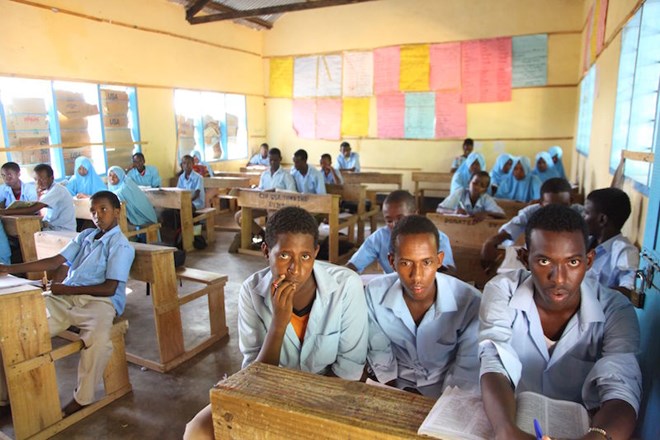
Thursday June 8, 2017

Students at Iftin Primary School in Garissa, Kenya. Religion News Service photo by Fredrick Nzwili
GARISSA, Kenya, June 8 (Xinhua) -- Education crisis has hit Kenya's northeast Garissa county bordering Somalia after non local teachers fled the restive region due to increased terror attacks by Al-Shabaab militants.
The teachers have cited last week's killing of their colleague in Fafi area by suspected Somali militants and increased improvised explosive devices (IEDs) attacks targeting security officers in the region.
Kenya National Union of Teachers (KNUT) Garissa County Branch Executive Secretary Abdirizak Hussein confirmed that non-local teachers in Hulugho, Liboi, Jarajila which have been hard hit by attacks, have left their duty station for fear of being attacked.
"It's in public domain that the Al-Shabaab militia are targeting non-locals in these areas. These areas are becoming very unsafe for our teachers and I support their move to leave," Hussein said in Garissa town on Thursday.
The latest attack is likely to cause panic among the few remaining non locals who will once again feel targeted by the Somali based militant group.
The increased attacks in 2015 prompted some trade unions, including those of teachers, civil servants, and medical workers, to order workers out of the clash-hit Mandera County which then was under increased terror attacks.
The education sector was the most hit in northern region in 2015 and early 2016 as some non Muslim teachers posted to Wajir, Garissa and Mandera counties declined to resume duty and instead, pitched camp in Nairobi seeking transfers to other regions citing insecurity among a host of other challenges.
"It's a double strategy for our teachers. Their work stations are not safe, the roads which the Al-Shabaab are planting IEDs are not safe. They are now finding themselves between a hard place and a rock," Hussein added.
Primary Schools in Damajaley, Hamey, Kulan, Yumbis, Fafi and Liboi are amongst those adversely affected.
Non local teachers teaching in the troubled areas who did not want to be identified expressed their fear for their lives.
"I don't see myself going back to that school, surely after narrowly escaping death from the militants who killed my colleague how can I go there, no way," said one of the affected teachers.
The teachers are demanding the government to solve insecurity in the region to deter any instances where they are being targeted by local communities as revenge whenever security operations are carried out in the region.
Hussein said that the area lawmaker, education stakeholders, national and county governments should convene an urgent meeting and come up with a plan that will ensure that learning is not interrupted in these areas.
"Children in border schools have a right to education and insecurity should not be an excuse to deny them this right," he said.
The union official said that locals from these areas should be recruited as untrained teachers to feel in the gaps. They should be placed in teacher's training colleges when schools are closed, he added.
"Meanwhile teachers in these areas should be moved to safer sub-counties among them Garissa, Lagdera, Balambala, Lagdera, parts of Ijara and Fafi instead of allowing them to leave," he said.
"If we don't move fast to address this problem now, we may end up with another teachers shortage crisis in this county," he warned.
The Al-Shabaab has changed tact and are now planting IEDs by the roadside mostly targeting vehicles carrying security officers.
The most affected is the Kulan-Liboi road where four aid workers were killed on Tuesday when their vehicle ran over an IED.
In the past three weeks more than 10 people, majority of them police officers, have been killed by IEDs on the same road.
Garissa County witnessed a mass exodus of non-local teachers immediately after the Garissa University attack that claimed lives of more than 148 people, most of them students.
Although they started coming back after security improved in the past one year, the situation may change.